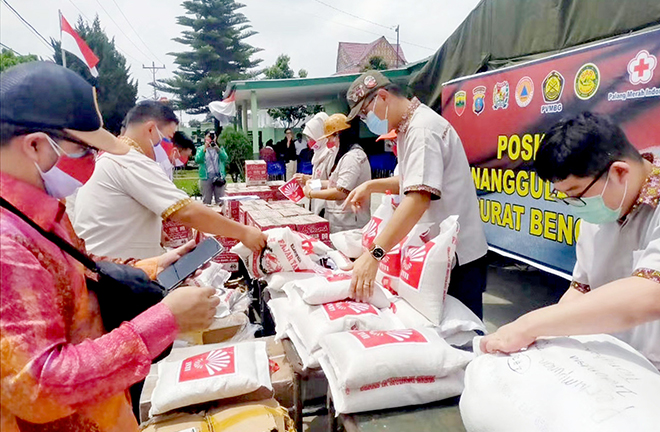
The Chinese Indonesia Association offered supplies for aid including rice, sugar and facemasks to native Indonesians. Photo: CNS
Throughout its history, human society has been plagued by poverty. As globalization continues accelerating, poverty has not been confined to any one country or region. Instead, poverty became a global issue that is difficult to resolve, and absolute poverty and relative poverty coexist in many places. Human society has made relentless efforts and taken on hard struggles to alleviate poverty while seeking to build an ideal society. Despite their attempts at effective poverty elimination, these explorations mostly became “idle dreams” which were hard to realize before the birth of Marxism.
The birth of Marxism has offered scientific theoretical guidance for human society to eliminate poverty and build an ideal society, and the appearance of the socialist society lays an institutional foundation for poverty elimination. The unremitting efforts of the Communist Party of China (CPC) have blazed a poverty-reduction path with unique Chinese characteristics which is remarkable in human history.
As a newly arisen concept in historiography, global history is an emerging branch in the discipline of history. With trans-state, trans-border, trans-national, and cross-cultural phenomena in history as the objects of study, global history examines history by extending regional visions and considering interactive perspectives. Holistic and interactive views are the two basic concepts embodied in the discipline of global history. Reviewing China’s experience of poverty alleviation through these two perspectives is thus of important theoretical and practical significance.
From a holistic perspective, China’s achievements in poverty reduction have written a new chapter in the world’s anti-poverty history. On one hand, with China as the world’s largest developing country, the poverty reduction acts have largely expedited the global anti-poverty course. Chinese people’s battle against poverty has been long in human history. Since the reform and opening up, a total of 0.77 billion rural residents have been lifted out of poverty according to the current standard measurement of the poverty line.
Notably, since the 18th National Congress of the CPC, the cause of poverty reduction in China has progressed substantially and achievements globally praised have been made. In the context of the grim global poverty situation and the exacerbated gap between the rich and the poor in some countries, China has won the battle against poverty. Ten years ahead of schedule, China realized the poverty-reduction target stipulated in the 2030 Agenda for Sustainable Development adopted by the UN, and considerably narrowed the scale of the world’s impoverished population.
From an interactive perspective, China’s poverty reduction feat has made new contributions to international cooperation in the anti-poverty sector. This interactive view requires an understanding of history and a grasp of interactions between subjects in an interactive network system. The outcomes of China’s anti-poverty work have set an exemplary and model role for anti-poverty actions in other countries and regions. At the same time, while accepting aid from the international community, China has shouldered its responsibility for undertaking poverty reduction efforts in other countries and regions, as its capacity allows. The accumulative total of foreign aid capital that China offered to 166 countries and regions from 1950 to 2016 amounted to over 400 billion RMB. Foreign aid projects totaled more than 5,000, among which, there have been about 3,000 complete sets of projects. More than 11,000 training classes have been implemented which trained 0.26 million personnel who came from developing countries to China. Around 0.6 million aid workers dispatched by China to other countries, more than 700 have sacrificed their precious lives due to anti-terrorism acts, natural disasters and other injuries while working under ordeal circumstances of aid offering. The interest-free loans offered by the Chinese government to heavily-in-debt countries and the least developed countries have been exempted seven times. In addition, China has offered medical assistance to 69 countries and provided assistance to more than 120 developing countries to implement the Millennium Development Goals.
In addition, China tries to create favorable conditions for developing countries and regions to alleviate poverty. For example, with the “Belt and Road” initiative, Asian Infrastructure Investment Bank and the Silk Road Fund, China is committed to supporting developing countries in improving their own development capacities. With this assistance, these countries become better integrated into the global supply chain, industrial chain, and value chain. This transcends beyond a simple “transfusion” type of aid, and deepens international cooperation in the anti-poverty sector.
The history of human society’s complex struggle with poverty demonstrates that the elimination of poverty on a global scale cannot be achieved in one attempt. As COVID-19 continues to surge around the globe and the trend of anti-globalization escalates in a creeping way, the uncertainty and instability the global economy faces in its path towards sustainable development is ever more prominent. Efforts to reduce poverty have been disrupted or are even receding in some countries due to the economy’s sluggish and stagnant state.
As such, countries should embrace the challenge of global poverty governance and actively promote the realization of the 2030 Agenda for Sustainable Development as adopted by the UN according to schedule, for a community with shared future for mankind which is poverty-free with shared development for all.
Wang Yugui is a professor from the Department of History at Soochow University and deputy director of Jiangsu Provincial Association of Social History.
Edited by BAI LE

